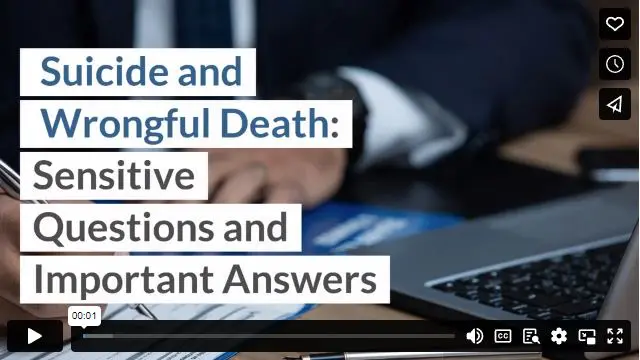Las Vegas belongs to one of the few states that acknowledges that suicide may, under special circumstances, be considered a wrongful death. In legal terms, wrongful death is a death for which someone else (or some company or institution) is legally to blame.

(StockSnap / pixabay)
What is wrongful death?
According to the law, a “wrongful death” is a death that has resulted from someone else’s negligence. Depending on the situation, a legal representative or heir may be permitted to file a wrongful death lawsuit on behalf of the surviving family members to help compensate for their loss.
Why should I consider filing a wrongful death suit after a suicide?
There are two important reasons to consider filing a wrongful death suit. Firstly, a successful lawsuit can provide the financial resources to pay for outstanding medical bills, funeral expenses, and replace the income that the loved one would have provided. Secondly, a successful lawsuit holds the culpable party accountable and helps prevent similar tragedies from happening to others.
If successful in court, a wrongful death suit will not bring your loved one back. It’s common for family members to wonder if a wrongful death suit will be more trouble than it’s worth, since the one thing they really want – their loved one back with them – is impossible.
Speaking to a reputable wrongful death lawyer here in Las Vegas may give you a better idea of the emotional and financial costs of pursuing a wrongful death suit. An initial consultation (at no cost to you) will help you process both the advantages and disadvantages of legal action.
When is suicide considered a wrongful death?
A suicide may be considered someone else’s fault (i.e,. a wrongful death) if:
- the other person owed the deceased person a special duty of care and was negligent to provide that care.
- the other person engaged in extreme bullying, taunting, or ridicule.
- the other person was a medical or mental health professional who mismanaged the deceased person’s care.
- there is evidence that someone else contributed to the situation leading to the deceased person’s suicide. (A person who knew about a suicide attempt but who did nothing to stop it or to alert authorities, may also be culpable, according to the unique situation.)
Even if the negligent party did not have a special relationship with the deceased, the law recognizes that people have a general duty not to cause harm to other people.
What if the bully or bullies had no special relationship with the deceased?
If a person willfully inflicts emotional harm on another person with reasonably foreseeable consequences of their actions, they can be held liable for the harm that was caused. In the case of taunting, bullying, or stalking, no prior or special relationship with the deceased is necessary to establish legal liability.
If you have questions about who may have played a role in your loved one’s suicide, find answers by speaking with a qualified wrongful death attorney near you.
Is there a statute of limitations with wrongful death suits in Nevada?
Yes. The statute of limitations determines how soon after the wrongful death the legal suit must be filed. In Nevada, the statute of limitations for wrongful death claims is usually two years after the death date. However, if the wrongful death is involved in a criminal case, then the time limit to sue may be extended.
Is suicide in a mental ward, prison, or hospital considered a wrongful death?
Yes. If a patient or inmate has been placed on suicide watch, the facility is bound to meet a minimum standard of care for the patient or inmate. However, these facilities are often understaffed or under-trained. When a facility or institution fails to meet the legal requirements for patients in their care, the institution is considered responsible for a death by suicide. When a suicide happens, it is considered a huge liability for the facility.
Who can file a wrongful death suit after a suicide?
If the suicide victim is unmarried and childless, then the victim’s legal heirs may file a wrongful death suit. The victim’s heirs following an order of seniority are:
- parents of the deceased
- siblings of the deceased
- the closest surviving family member of the deceased who is not a parent or sibling.
If the suicide victim is married, then that person’s surviving spouse, domestic partner, or children may file a lawsuit.
In Nevada, the only other party that may file a wrongful death suit besides a legal heir is the personal representative of a deceased person’s estate.
Can I file a wrongful death suit if I am not a family member, but I have a close attachment to the deceased?
If a person is named in the deceased person’s will, they are not eligible to file a wrongful death claim unless they are also an heir or legal representative of the deceased’s estate (see paragraph above).
Close friends, significant others, and fiancees are, likewise, not eligible to file a wrongful death action for the deceased, even if they were named in the deceased’s will.
What kind of lawyer is best equipped to answer questions about suicide and wrongful death?
To discuss sensitive questions about suicide and wrongful death compensation, contact a personal injury lawyer near you. The initial consultation, free of charge, will help answer questions that are particular to your unique situation. Personal injury lawyers are commonly called “accident lawyers,” “wrongful death lawyers,” or even “trial lawyers.”
Video

